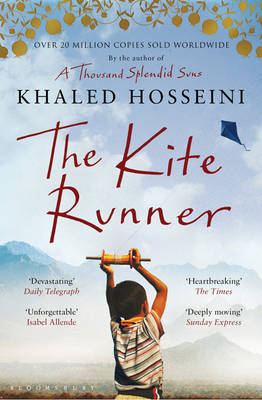Author: Khaled Hosseini

Book Blurb:
1970s Afghanistan: Twelve-year-old Amir is desperate to win the local kite-fighting tournament and his loyal friend Hassan promises to help him. But neither of the boys can foresee what will happen to Hassan that afternoon, an event that is to shatter their lives…
Since its publication in 2003, The Kite Runner has sold eight million copies worldwide. Through Khaled Hosseini’s brilliant writing, a previously unknown part of the world was brought to life.
My Review:
Almost seven years ago, on a trekking trip, we had a one day stop in Delhi, where I found a cool second hand book stall. Not being able to resist a book at a bargain, I got two books: The Kite Runner and Eleven Minutes. I had never heard of either of them, but fell in love with both.
But, unfortunately, someone must have borrowed my copy, and never bothered to return it. I HATE when people do that. (Dear person who might have borrowed my this or any other book, please return them, that would be great.). But yea, I really missed it, and on a recent trip to another second hand store, I found this copy, in good condition, I got it. It’s another edition, but, still, it’s the same story.
Reading the book the first time, I was quite taken in by Hassan, his loyalty and his outlook on life. That is what attracted me. But, reading it the second time, after all these years, with more knowledge of the war as well as being more exposed to complex characters, I saw a lot of depth in the story, which was previously missed.
This time around, I was drawn to Amir more than Hassan. No doubt Hassan was amazing, but Amir, the only son, who just wants his father’s attention, but that attention goes to Hassan. I could see why Amir acted the way he did. I had new found respect for Amir and his father, when they choose to view his wife for who she was instead of her past, and her for being frank (but not apologetic) about her past before getting married. To do this in a highly conservative society, is commendable.
The societal aspects are shown brilliantly, how a servant Hazara boy who is a friend, but not when others upper caste boys come, the castism, the hatred, the Soviet invasion and the Taliban’s effect, the stoning scene..everything just brilliantly comes together to form this masterpiece.
The story is absolutely amazing and inspiring and this book is definitely one of the best books I have read.
Buy this book from:
The movie adaptation of this book is pretty good too, it gets the crux of the story right and not many changes are done.
Check out the trailer here:


